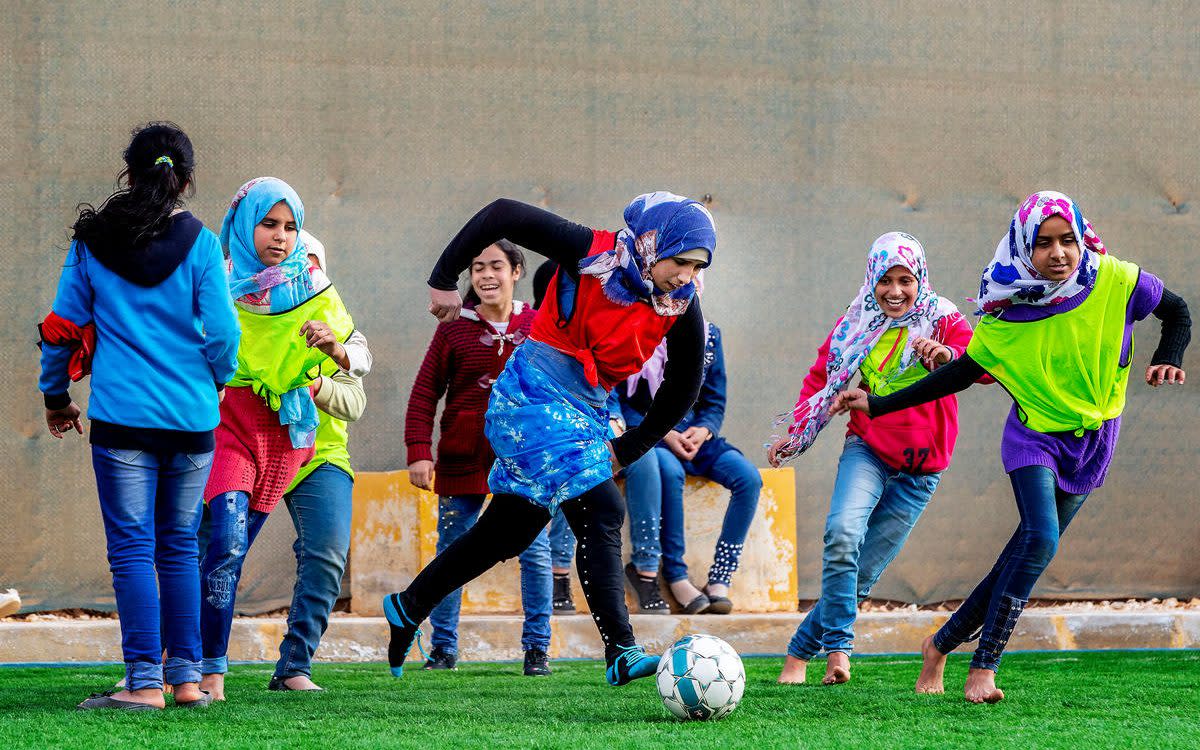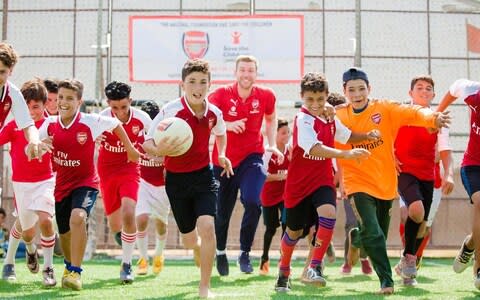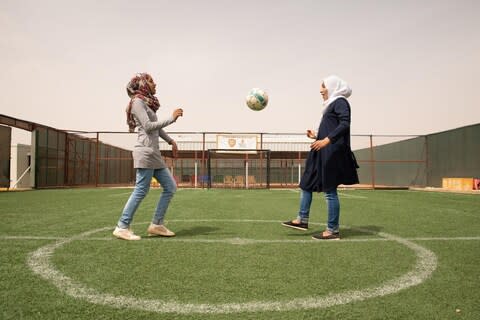How the beautiful game can help heal the scars of war

Imagine you are a 10-year-old child, trapped in a city under bombardment. Friends have been killed or wounded, your school has been destroyed and food is scarce. After two years of this terror, your parents flee with you to a new country and an uncertain future.
Welcome to the world of Ahmed, whose family abandoned their home in the besieged Syrian town of Daraa and joined 80,000 compatriots in Zaatari refugee camp in Jordan. All is not lost, however. Ahmed is one of hundreds of traumatised children who have benefited from one of the most innovative and remarkable initiatives in sport.
The Arsenal Foundation, set up eight years ago by the Premier League football club, has joined forces with Save the Children in a unique programme called Coaching for Life to help children like Ahmed rebuild their lives.
Five all-weather pitches have been installed in the camp, funded by Arsenal with donations from players. The foundation has taught 14 coaches to focus the minds of the children who play there on sharing experiences and managing emotions alongside a rigorous training schedule.

It has worked for Ahmed, now aged 13.
His mother said: “When we came to Zaatari he was so withdrawn he would barely speak. He had nightmares and couldn’t sleep. There were so many tears and he was angry. A silly argument with his sister over a toy would make him fly into a rage. He went to school but was learning nothing and fighting with other boys.”
These are some of the tell-tale symptoms of traumatic stress. If it is not addressed, it can lead to a lifetime of mental health problems. The good news is that after 20 weeks of Coaching for Life, Ahmed’s smiles and energy have returned. According to his mother, he talks more openly about his feelings, controls his anger and concentrates at school.
The programme reflects the club’s long history. For more than 30 years, Arsenal – whose stated values include togetherness and innovation – has been working with some of the most deprived communities in north London. Its 40 local projects reach 6,500 participants a week. They use the power of football to support inner city children facing violence and mental ill health.

Community coaches have developed methods of combining mental wellbeing assessments with one of the most potent of all antidotes to low self-esteem and social isolation: being part of a team. Perhaps the greatest benefits are the confidence and resilience that come from learning how to communicate effectively, improving discipline by following rules and, most importantly, making new friends.
Save the Children, whose values include ambition, creativity and collaboration, has more than 100 years’ experience of protecting children in conflict. By working together, we are bringing the healing potential of football to places where Save the Children works in Jordan and Indonesia. Our programme starts and finishes with an assessment of resilience and the early signs in Zaatari are that it is particularly beneficial to the many children who are not in school.
We have already engaged 568 children. Our aim, as the Arsenal Foundation and Save the Children will explain at the World Economic Forum in Davos this week, is to reach 1,800 over the next two years, with equal numbers of boys and girls participating.

Teaching children how to advocate for change has been built into the coaching sessions. The children are helped to form peer groups to address issues that worry them.
“I love the football,” said Shalima, a 14-year-old graduate of the girls’ programme. “But we have also learnt to be a team against early marriage, harassment and violence in schools – Coaching for Life has given me a voice to influence what happens in my life.”
There is something profoundly humbling about standing on a pitch in a refugee camp watching children start to heal themselves through football.
Zaatari is a world away from the Premier League but the beautiful game is the ultimate leveller. Among the first hands to go up at a recent auction to pay for another new pitch were those of Pierre-Emerick Aubameyang, Arsenal’s top scorer, and two younger players who are products of the club’s academy.

Of course, football alone will never be enough for children who have gone through such horrifying experiences before reaching Zaatari. That’s why the programme provides both children and the people looking after them with psychological support. But supporting children traumatised by war is incredibly difficult. We have invested in a robust monitoring and evaluation system to capture results and identify areas for improvement.
Around the world, 142 million children are living in areas affected by conflict. Many will emerge, like Ahmed, in need of mental health support. Their distress can lead to feelings of anxiety, depression, hopelessness and worthlessness in the short term. At its most severe, it can affect long-term physical and cognitive development.
Organisations such as the Arsenal Foundation and Save the Children can help some children cope better but cannot solve a global mental health crisis among those trapped in war zones. What we can do is show that solutions are possible – and that the world cares.
Kevin Watkins is chief executive of Save the Children. Vinai Venkatesham is managing director of Arsenal Football Club.
Protect yourself and your family by learning more about Global Health Security: sign up to our weekly health bulletin newsletter

